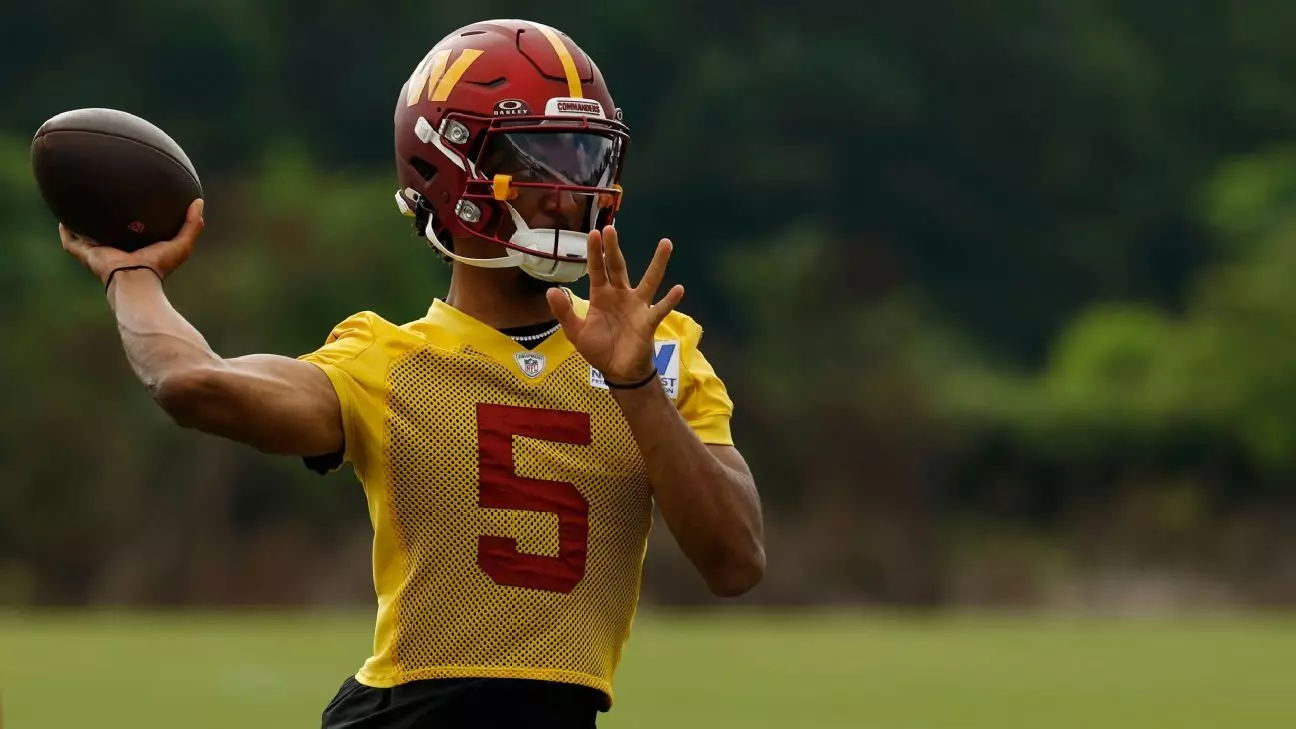In the high-stakes world of professional football, few transformations are as striking as that of Jayden Daniels. Once a rookie navigating the complexities of the NFL and trying to find his footing, Daniels now exhibits a profound level of maturity and confidence. His journey underscores a vital truth: experience and familiarity breed competence, which in turn forge leadership. Daniels’ recent comments reveal a man who has shifted from a learner to a pivotal leader within the Washington Commanders’ offense.
While last season was nothing short of remarkable—earning him the Offensive Rookie of the Year award—the current iteration of Daniels suggests he’s outgrown the beginner’s phase. His admission of being “more used to coordinator Kliff Kingsbury’s offense” and his teammates indicates a deepening understanding of not just the playbook but the nuances of execution and team dynamics. This evolution is not merely about increased comfort; it signifies a strategic mastery that allows him to manipulate defenses and adapt on the fly with confidence. The fact that he’s now a vocal presence, ready to discipline teammates, marks a critical transition from a passive participant to an active enforcer of standards.
Mastering the Offense: The Tactical and Mental Shift
Daniels’ ascent is rooted in a heightened cognitive grasp of the game’s intricacies. His declaration of being able to “understand what Kliff is calling” and “what we want to accomplish” reflects a shift from reaction to anticipation. With a richer toolkit—including various protections and run options—he can now choose the right response against different looks. Such tactical fluidity is often the hallmark of seasoned quarterbacks, and it’s a sign Daniels is aligning himself with that elite echelon.
Moreover, his improved processing speed—acknowledged by Coach Dan Quinn—dresses an intangible yet crucial trait: mental clarity. Football at the NFL level demands split-second decision-making, and Daniels’ ability to process information faster results in fewer mistakes and a higher level of game management. This mental evolution is arguably more valuable than physical skill because it sustains performance under pressure, a quality that distinguishes good players from great leaders.
Leadership as a Developmental Journey
If there is a particularly striking aspect of Daniels’ growth, it lies in his emerging leadership qualities. Last year, the coaching staff emphasized that he should focus solely on executing plays rather than shouldering leadership responsibilities. However, his actions in practice—such as ejecting a teammate from the huddle—demonstrate an internal shift that transcends instructions. This is a quarterback stepping into the role of a standard-bearer, actively shaping team culture.
Austin Ekeler’s observations further reinforce this narrative. Daniels’ authoritative response to a false start incident, invoking the notion of accountability, broadcasts a message that he’s not simply a participant but a disciplinarian and inspiration. This ability to hold teammates accountable, especially as a young player, marks a new chapter in his career. It implies that Daniels recognizes the importance of leadership in elevating team performance, an understanding that will undoubtedly serve him well in critical moments.
The Road Ahead: Embracing Responsibility for Team Success
Daniels’ comments reveal an acute awareness that being a franchise quarterback extends beyond throwing passes and avoiding turnovers. It’s about cultivating a culture of accountability, setting high standards, and exemplifying professionalism both on and off the field. His acknowledgment of “upholding the standard” hints at an internalized responsibility that could define his legacy. As he continues to develop, his growth could inspire his teammates to elevate their own performances, creating a ripple effect of discipline and excellence.
What remains to be seen is whether Daniels can sustain this growth through adversity and maintain the consistency required of an NFL leader. His trajectory thus far suggests he has the mental acuity and emotional intelligence—cornerstones of true leadership. If he continues on this path, the Washington Commanders will benefit from not just a talented quarterback, but a transformative figure capable of guiding the team to new heights.
Ultimately, Daniels’ journey exemplifies a broader truth in sports: talent alone is insufficient. True greatness is forged through perseverance, self-awareness, and the courageous assumption of responsibility. His latest development hints at a promising future—one where a young quarterback not only evolves physically but also matures into a pivotal leader whose impact extends beyond the scoreboard.

